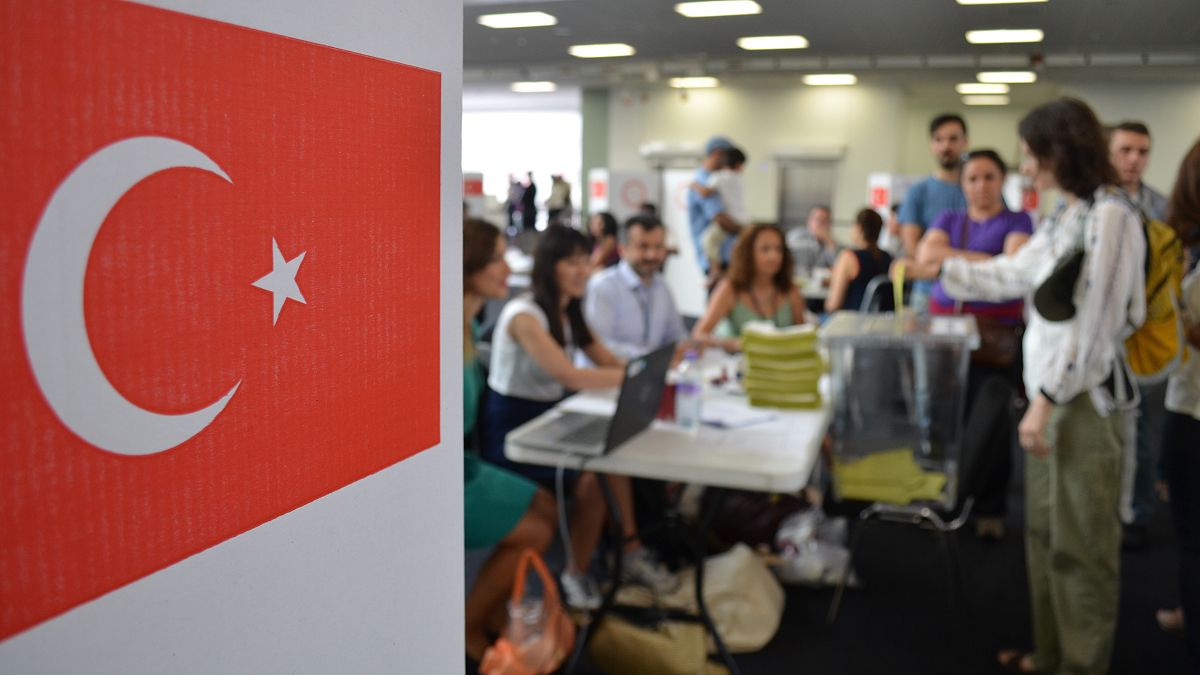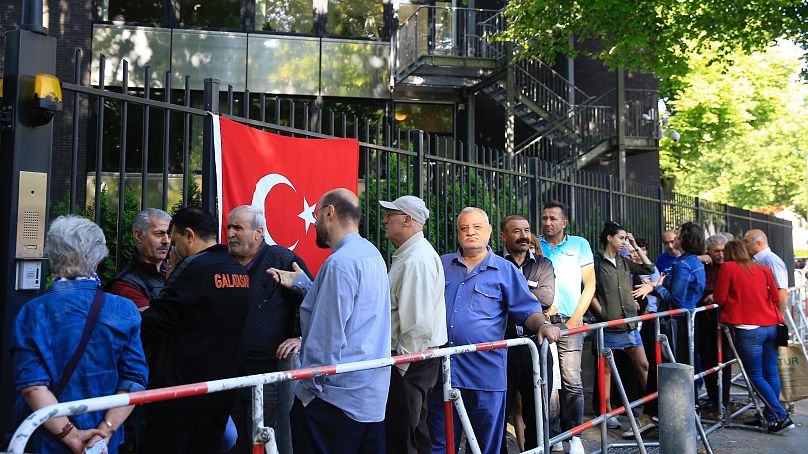Turkish citizens living abroad will be heading to the polls from 27 April, with the disapora community making up 5% of all eligible voters.
Sultan has lived in London for more than two decades.
The 59-year-old housewife is close to her extended family and enjoys spending time with the three grandchildren.
And like many other Turkish nationals living abroad, Sultan plans to cast a vote in the upcoming Turkish elections.
“I need to know who is ruling my country, if I am given this right, I need to have a say. It is my country at the end of the day,” she tells Euronews.
“We keep the ties alive with our home country. We always travel and stay there for months sometimes. When there, we use the same daily services such as hospitals and post offices with the people residing in Turkey. So why shouldn’t we?”
“People criticise me for living in London and being involved in Turkish politics,” she continues.
“I tell them, when I left Turkey, the atmosphere was different. We just had a massive earthquake at the time in 1999. I didn’t have many opportunities for work. The general situation wasn’t so great. But although I believe things have improved, it is not easy for someone to relocate at a certain age when you need your children and grandchildren around you”.
'If those granted citizenship later in life can vote, why shouldn't we?'
Forty-year-old Umut is a business owner in the construction industry and called France home for the past 17 years.
He tells Euronews he'll be heading to the polls for the election to exercise his democratic right, but he adds: "My situation might be different to others as I have businesses in both countries. I travel between the two often, so I believe I have a say."
"Many Turkish living in Europe feel they belong to Turkey. Even if they are born and bred here, they always have a dream of returning one day, although deep inside know they will never go back".
Umut believes people who are against extending voting rights to the Turkish diaspora are not criticising the right to vote, but are more likely critical of the fact it was the current AKP government who made it possible since they know a majority of voters overseas are on their side.
Asked what his priorities are when deciding on how to vote, Umut says, “justice, an independent judiciary”.
“If a non-Turkish person, for example, an Iranian or someone from the Gulf states, is granted citizenship, hence the right to vote when they invest in Turkey, why shouldn’t we? Nearly all Turkish citizens living abroad have some kind of investment in Turkey”.
The father of three says his children are unlikely to vote in Turkey's elections when they become eligible.
“They identify themselves as French first, then Turkish. I don’t think they will be interested in Turkish politics”.
Millions of voters overseas
Sultan and Umut are just two of more than three million Turkish nationals who live abroad, and who are eligible to vote in the upcoming elections on 14 May - around 5% of the total electorate.
With polls suggesting the race will be neck-and-neck between the two main candidates, overseas voters could potentially play a decisive role in deciding the outcome.
The question of whether expatriot Turks should even get a say in determining the fate of the country they don't live in comes up at each election, since they were given the right to vote back in 2012.
Turkish nationals with residency abroad cast their first votes remotely for the first time in 2014 for the presidential elections. Previously, those residing abroad could only vote at border gates.
Critics of the right to vote abroad argue that Turkish migrants living in the West are well off with better living standards, unaffected by the internal politics of Turkey and enjoy the rate of the currency they earn against the Turkish Lira.
Defendants say it’s a democratic right.
'Where do we set boundaries?'
For Emre Erdogan, a professor of political sciences at Bilgi University, the governing bodies should be inclusive when deciding who should vote.
“If we defend that it is a right derived from citizenship, then migrants or refugees cannot vote. But they are directly affected by the policies of governments or affect the policies directly. However we do not give them a voice,” he tells Euronews.
“So arguing that people should be voting only at their residential country becomes restrictive.”
“Where do we set boundaries?” he asks.
“There are many people especially residing in Germany who have investments in real estate in Turkey. There is no harm in being inclusive.”
Erdogan argues the issue of external voting cannot be discussed without examining the policies of Turkey towards its nationals living abroad.
“When we look at Germany example, Turkey saw the potential in mobilising a mass population of Turkish nationals at the time of Turgut Ozal’s leadership,” he says.
“The main aim was to keep the Turkish identity. These policies were not aimed at integrating Turkish citizens into the countries they have settled in. Those who emigrated abroad embraced religion whenever they had to overcome issues they faced or to maintain their political or national identities. This has created a hinterland of Turkey in Germany. Therefore, it was already known who would benefit the most from this kind of hinterland,” Erdogan tells Euronews.
“At the same time, the Kurdish movement is also a powerful movement abroad, especially in France and more in Sweden."
“When it comes to Social Democrats or the opposition in Turkey, they have failed to grab the attention of Turkish people living elsewhere. They don’t take enough action in this field.”
Ayhan Kaya, a professor of politics and director of the European Institute at Istanbul Bilgi University, believes participating in elections from abroad shows that the political, cultural, social and economic ties of those living outside Turkey with their homeland remain strong.
"These ties are growing stronger with the globalisation that offers more accessible communication and transportation", he says.
The previous election results show each country has a different voter profile. The majority of Turkish citizens favour current president Recep Tayyip Erdogan in Germany, but those in the UK favour the pro-Kurdish HDP or main opposition party CHP.
According to Prof Kaya, this can be explained by the integration policies of each country.
For example, Germany, where most Turkish migrants live, does not allow dual citizenship. Those who don’t give up their Turkish IDs for a German one tend to be much more patriotic or have a strong religious identity. It is no surprise that these voters favour Erdogan over parties of the left.
“Another factor that determines the voter’s decision is the underlying reason for living abroad. A significant portion of people of Turkish origin living in countries such as the UK, Switzerland, the USA and Sweden are refugees who distanced themselves from the government in Turkey. This explains why there are differences of voter tendencies in different counties.”

